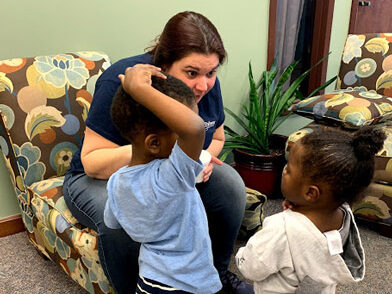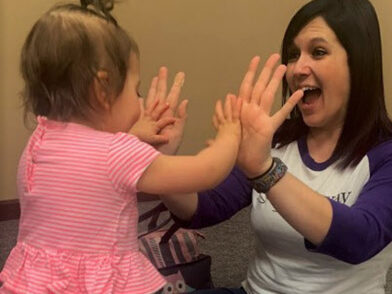
5 Tips to Show Love to a Child in Your Life
Nurturing Love: A Guide for Foster Parents and Caregivers
February, often associated with love, presents a unique opportunity to reflect on the profound impact of affection on a child’s life. At Pathway Caring for Children, we understand that love encompasses more than just romantic gestures or material expressions. For children in foster care, the concept of love can be complex and often misunderstood.

Nurturing Love: A Guide for Foster Parents and Caregivers
February, often associated with love, presents a unique opportunity to reflect on the profound impact of affection on a child’s life. At Pathway Caring for Children, we understand that love encompasses more than just romantic gestures or material expressions. For children in foster care, the concept of love can be complex and often misunderstood.
Understanding Love Through a Child’s Eyes
Children who have experienced trauma or neglect may struggle to comprehend or express love in conventional ways. Their perception of love is often shaped by media portrayals and peer interactions, which can vastly differ from the nurturing care they need from a caregiver.
The Importance of Consistent Care
For many children in the foster care system, emotional development has been marked by hurt, grief, and longing. These experiences can make it challenging for them to trust and form secure attachments. As caregivers, it’s crucial to recognize that behaviors that may seem like “pushing boundaries” are often cries for unconditional love and acceptance.
Five Powerful Ways to Show Love to Foster Children
- Verbal Affirmation: Building Self-Worth Through Words
- Offer consistent encouragement and praise
- Use specific compliments to reinforce positive behaviors
- Acknowledge efforts and improvements, not just results
- Quality Time: Strengthening Bonds Through Shared Experiences
- Engage in activities the child enjoys
- Create regular one-on-one time for each child
- Be fully present during interactions, minimizing distractions
- Consistency and Predictability: Creating a Safe Haven
- Establish and maintain routines
- Set clear, age-appropriate expectations
- Follow through on promises and commitments
- Empathy and Understanding: Validating Emotions and Experiences
- Listen without judgment to the child’s feelings
- Acknowledge the difficulty of their experiences
- Offer support and guidance in managing emotions
- Active Listening: Fostering Open Communication
- Give your full attention when the child is speaking
- Use non-verbal cues to show you’re engaged
- Reflect on what you’ve heard to ensure understanding
The Long-Term Impact of Love in Foster Care
Consistent, nurturing care can have a transformative effect on children who have experienced trauma. By implementing these strategies, foster parents and caregivers can help children develop:
- Improved self-esteem and confidence
- Better emotional regulation skills
- Stronger ability to form healthy relationships
- Increased resilience in facing life’s challenges
Pathway’s Commitment to Supporting Foster Families
At Pathway Caring for Children, we recognize the vital role that foster parents play in the lives of vulnerable children. Our organization is dedicated to providing comprehensive support to ensure that both foster children and their caregivers have the resources they need to thrive.
Training and Education
We offer ongoing training opportunities to help foster parents develop the skills necessary to provide trauma-informed care. These sessions cover topics such as:
- Understanding the effects of trauma on child development
- Effective communication strategies for children of all ages
- Techniques for managing challenging behaviors
- Self-care practices for foster parents


24/7 Support
Our commitment to foster families extends beyond regular business hours. We provide round-the-clock support to address any concerns or emergencies that may arise, ensuring that no foster parent ever feels alone in their journey.
Community Building
Fostering can sometimes feel isolating, which is why we facilitate connections between foster families. Through support groups and community events, we create opportunities for foster parents to share experiences, offer mutual support, and build lasting friendships.
The Pathway Difference: A Holistic Approach to Foster Care
Pathway Caring for Children takes pride in our comprehensive approach to foster care. We don’t just place children in homes; we create an ecosystem of support that encompasses:
- Mental health services for children and families
- Post-Adoption support and resources
- Transitional age services for youth aging out of the system
- Case management to ensure all needs are met
Our goal is to help children and families realize the full possibilities of their lives through foster care, adoption, and mental health services.
Becoming a Foster Parent: Taking the First Step
If you’re considering becoming a foster parent and want to make a significant difference in a child’s life, Pathway Caring for Children will guide you through the process. Our experienced team will:
- Provide detailed information about foster care requirements
- Assist with necessary background checks
- Offer comprehensive training to prepare you for the journey ahead
- Support you every step of the way, from initial inquiry to placement and beyond
Conclusion: Be the Change in a Child’s Life
The power of love in a child’s life cannot be overstated. As a foster parent or caregiver, you have the unique opportunity to be a game-changer—to show children and teens they are worthy of care, attention, and unconditional love.
By implementing the strategies outlined in this guide and partnering with Pathway Caring for Children, you can create a nurturing environment that allows foster children to heal, grow, and thrive. Your love and dedication can help rewrite their stories, opening up a world of possibilities for their future. Are you ready to embark on this rewarding journey? Contact Pathway Caring for Children today and take the first step toward changing a child’s life forever. We will walk you through all the basic foster care requirements and necessary background checks to become a foster parent. If you inquire about fostering with Pathway, our recruitment manager will reach out.